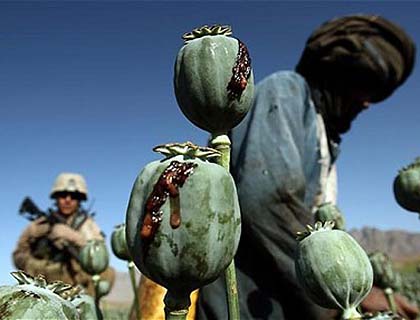In official Government press releases, they claim opium cultivation is the main source of income for farmers in the province; therefore it needs long-term strategy to reduce production. Millions of dollars have been spent in alternative crop supporting programs.
But recent history tells us a different story. For instance, farmers in Helmand, a.k.a Opiumistan, did not grow poppy in 70s and 80s, and under the last years of Taliban rule. If these peasants could make a livelihood through other crops, why they are unable to do so today, despite the attractive supporting-packages they are being offered in mega-million alternative-crop programs?
The US, Britain and Denmark financed $13 million for the eradication campaign last year. More than 42,000 farmers in Helmand were enlisted to receive subsidized wheat and fertilizer. The peasants paid only a quarter of the market price for the supply they were provided under this subsidy program.
According to latest media reports, there is a dangerous trend of new rise in the use of drugs in Afghanistan. According to a report from Herat, an increasing number of drug users are female. Statistics show that annually there are more than 150 new addicts. Among them, there are also pregnant women, who transfer this deadly-addiction to their newborns.
It is more dangerous, because children of a female addict also become addicts.
In the kingdom of Opiumistan, Governor Mengal is credited for the support-package dubbed as "food zone program". For the last two years, we have seen their failure to bring a big difference. The question is, how long will the international community continue financing the campaign, and the Anti-Narcotics Ministry keep 'bribing' the farmers to stop poppy cultivation? The Government has been very soft in the opium war. There are certain reasons behind this.
The answer to this question is clear. The drug business is not that simple. There is a big mafia that controls the supply and cultivation, with support from bigwigs in the corridors of power.
The official argument and statistics is that 60% to 70% of the farmers in Helmand depend on poppy production, and if there is an eradication campaign of destroying the crops, it will "push" the peasants to insurgency. With this logic, the poorest of Afghanistan in Badakhshan and Daikundi should have been the Opiumistan, or centers of insurgency. It is not a reduction-campaign, but a bribery-package to the so-called 'farmers'. The myth that majority of farmers grow poppy because of extreme poverty is partly a propaganda and disinformation campaign by drug-lords and those who are in this business.
The Government has no efficient program for drug addicts. There is only one hospital of 150-bed for over 70,000 drug addicts in Herat. There must be strict checking and rehabilitation centers in Herat for all the returnees. The mounting number of drug addicts across the country is just one of the problems that come with Afghan refugees, besides the spread of HIV AIDS, prostitution and social problems. With easy availability of all kinds of drugs in cheap prices, it is spreading fast in other parts of the country.
Our economy depends heavily on drug trade. While talking at an international conference recently, the UN Secretary General Ban Ki-moon urged countries involved in Afghanistan to step up the fight to combat poppy cultivation and drug business. He said there cannot be sustainable development when opium production is the only viable economic activity in Afghanistan, and added that there cannot be stability when 15 percent of our gross domestic product comes from drug trade.
The UN Secretary General said Afghanistan's drug economy is worth $2.4 billion. He emphasized that the Afghan Government must prioritize the issue of narcotics. Law enforcement agencies must work harder on eradication crops, eliminating laboratories, keeping precursors from entering the country.
According to a UN report released last year, poppy cultivation in Afghanistan has increased significantly. The report said there has been an increase of seven percent in the year 2011 compared to the year before that. The increase was reported despite the fact that Ministry of Antinarcotics had claimed to have destroyed 65 percent of the total cultivation that year.
The US and its NATO allies caught up in the prioritize of an exit strategy, are largely ignoring the focus on poppy eradication, and our Government with some bigwigs of the power corridor involved in drug profits have always been opposing effective and harsh programs of eradication.
The Government and international forces should enforce the poppy eradication campaign. The war on poppy is forgotten. Aside from the fact that a huge part of the financial support to insurgents comes from transport and smuggling of opium, it's also exporting deaths to millions of people around the world, and the number of drug addicts increasing in Afghanistan.
Taliban militants get $400 million a year through direct and indirect revenue from poppy cultivation, transportation and trade.

